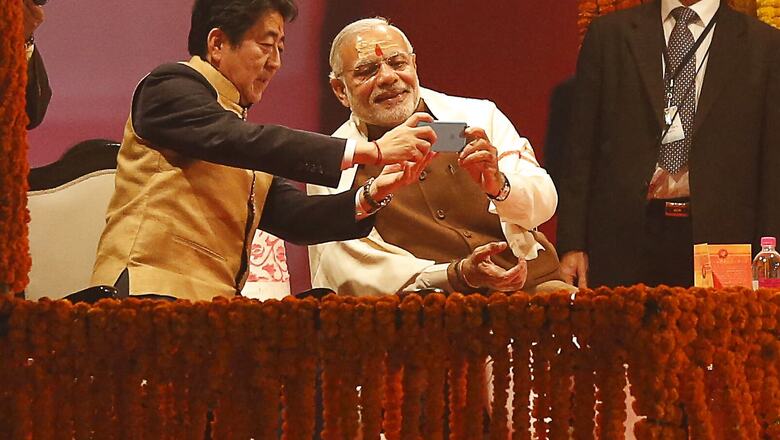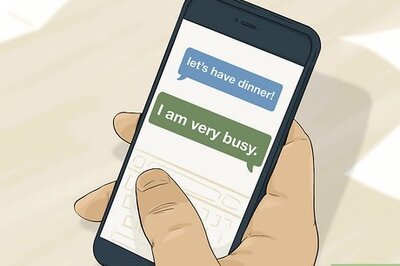
views
Soon after reports surfaced on Friday that former Japanese prime minister Shinzo Abe was shot, Prime Minister Narendra Modi sent out a tweet praying for Abe’s quick recovery.
External affairs minister S Jaishankar in a tweet said that Abe’s admirers across the country were distressed after hearing that there was an attempt on his life and were praying for him and his family.
Deeply distressed by the attack on my dear friend Abe Shinzo. Our thoughts and prayers are with him, his family, and the people of Japan.— Narendra Modi (@narendramodi) July 8, 2022
Congress and opposition leader Rahul Gandhi also tweeted hoping for Abe’s recovery and said he was shocked to hear the news.
On Friday morning, Tetsuyo Yamagami shot Shinzo Abe as he was addressing a gathering at Japan’s Nara city. He is taken to the hospital and Yamagami (41) remains under police custody.
The reactions by PM Modi, Union minister Jaishankar and opposition leader Rahul Gandhi on the news of attempt on Abe’s life reflects on the deep ties between the Indian political establishment and Japan. The former Japanese prime minister Shinzo Abe was instrumental to strong ties between India and Japan.
Abe visited India four times during his two stints as Japan prime minister. He visited in 2006, 2014, 2015 and 2017. This is the most number of times any Japanese prime minister has visited India.
Deeply shocked by the news about former Japanese PM Shinzo Abe. Join so many of his friends and admirers in India in praying for him and his family.
— Dr. S. Jaishankar (@DrSJaishankar) July 8, 2022
He also addressed the Lok Sabha in 2007, which is now seen as the foundation of the strong India-Japan ties that is seen today. During his famous address, Abe spoke about India’s culture, India’s history and how India maintained strong ties with Japan in the aftermath of Imperial Japan’s defeat in the second World War.
“It was exactly 50 years ago that my grandfather, Nobusuke Kishi, became the first Japanese Prime Minister ever to visit India. Then-Prime Minister Jawaharlal Nehru brought my grandfather to an outdoor “civic reception” at which tens of thousands of people had gathered, introducing him to a crowd energetically saying, “This is the Prime Minister of Japan, a country I hold in the greatest esteem.” This is a story I heard as a little boy from my grandfather,” Abe said
Shocked to hear the news of the attack on former PM of Japan, Shinzo Abe, who has been instrumental in deepening Indo-Japanese ties.Prayers for his recovery. My thoughts are with his family.
— Rahul Gandhi (@RahulGandhi) July 8, 2022
“As the leader of a defeated nation in a war, he must have been very much delighted,” Abe said while addressing the Lok Sabha in August 2007 in his famous ‘Confluence Of The Two Seas’ speech.
Prime Minister Narendra Modi and former PM Manmohan Singh both wooed Abe. PM Modi also chose Japan for his first bilateral visit which showed his commitment to further bring New Delhi and Tokyo together.
Abe also hosted PM Modi at his ancestral home in Yamanashi.
Abe and PM Modi also shared a keen interest in keeping the Indo-Pacific region free and inclusive. He was also the architect of the revival of Quad which was needed since China was casting its influence over the region in ways which were threatening the sovereignty of several nations.
Abe also took note of the 2017 Doklam clashes where Chinese forces used aggression to encroach into Indian territory and soon after that in Manila, the US, Japan, Australia and India met on the sidelines of the East Asia summit in Manila discuss how to tame the dragon.
He also played a key role in helping India boost its infrastructure. He upgraded the India-Japan bilateral ties to Special Strategic and Global Partnership. The Act East Forum was also formed where Japan started projects in India’s northeastern states to boost investment, job opportunities and people-to-people ties.
It was also during his visit that the Shinkansen system (bullet train) was introduced to India, though it is yet to be implemented. The Japan International Cooperation Agency (JICA) provided technical cooperation in developing the Delhi-Mumbai Industrial Corridor (DMIC) and many other projects.
There were also speculations that the India-Japan nuclear deal would not be successful when PM Modi visited Japan in 2014 but it was Abe who convinced the detractors of the proposal who were concerned about signing a deal with a non-Nuclear-Proliferation-Treaty member.
(with inputs from The Indian Express)
Read all the Latest News, Breaking News, watch Top Videos and Live TV here.



















Comments
0 comment